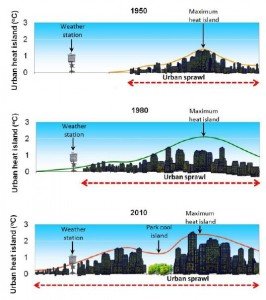* Corresponding author. E-mail:

Several studies have claimed that the warming bias introduced to global temperature estimates by urbanization bias is negligible. On the basis of this claim, none of the groups calculating global temperature estimates (except for NASA Goddard Institute for Space Studies) explicitly correct for urbanization bias. However, in this article, by re-evaluating these studies individually, it was found that there was no justification for this.
There is considerable evidence that there has been global warming since the late 1970s. The urbanization bias problem is sometimes incorrectly framed as being a question of whether there has recently been global warming or not. However, the recent warming appears to have followed a period of global cooling from an earlier warm period which ended in the 1940s. So, resolving the urbanization bias problem is necessary to address issues such as how the recent warm period compared to the early 20th century warm period. If the earlier warm period was comparable to the recent warm period, then claims that recent global temperature trends are unprecedented or unusual will need to be re-evaluated.
Latest version
Download article – Version 0.2 ![]() (Submitted: February 3, 2015)
(Submitted: February 3, 2015)
Older versions
Download article – Version 0.1 ![]() (Submitted: February 3, 2014)
(Submitted: February 3, 2014)
Supplementary Information is available through the FigShare website at http://dx.doi.org/10.6084/m9.figshare.1005090

This work is licensed under a Creative Commons Attribution-ShareAlike 4.0 International License.
This is a very good job.The study is interesting to the readers, and will be useful for further understanding and selecting reference climate stations for evaluating the potential urban bias in the surface air temperature data in some regions of the continents.
We would like to thank Yuan-Jian Yang for his kind and positive review.
In the year since we first uploaded this paper, we have had some useful comments from a number of readers of version 0.1, who between them have provided helpful feedback, spotted typos/mistakes, and suggested some relevant additional references. We have updated the original draft with these comments in mind. In particular, we have added a discussion on the Efthymiadis & Jones, 2010 study.
The new version (0.2) of our paper is available here, but we have kept a link to the original version (0.1) in the “Older Versions” archive above, for posterity.